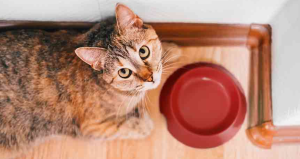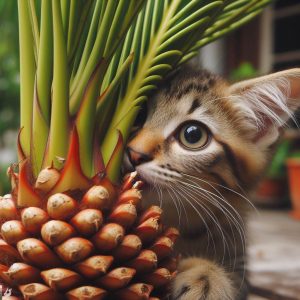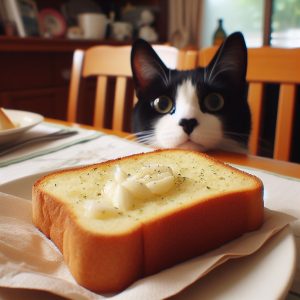Getting a new kitten is straight up awesome! But it also means having a crapload of questions, especially about feeding the little furball.
Let’s kick things off with the big question all new cat parents have “How Long Kittens Can Go Without Food before things get dangerous?”
Dude, as a new owner you gotta understand your kitten’s nutritional needs. Screw this up, and you could majorly hurt their growth and development – and that blows.
So here’s the deal, An average healthy kitten can usually go about 2 days without any food. But within just 1 day without eating, they’ll get malnourished, weak, and will probably need urgent care from the vet. Kittens have tiny tummies but CRAZY HIGH energy needs, so they need to eat little meals often.
The details matter here. Kittens and cats need the right food in the right amounts at the right times based on their age, size, and stage of life.
As the owner, you’ll be constantly tweaking your kitten’s diet as they grow. It’s just part of having a cat.
In this post, I’ll cover everything you need to know about feeding kittens.
When Kittens Need to Eat
Kittens have a very fast metabolism that requires them to eat more frequently than adult cats. Their little bodies are quickly burning through calories as they grow rapidly in the first few months of life. Kittens need to eat every 3-4 hours, ideally eating 6-8 small meals spread throughout the day. This frequent feeding schedule matches the eating patterns kittens would follow when nursing from their mother.
From the time kittens are born until they are around 4 weeks old, they survive entirely on their mother’s milk. Mother cats nurse their kittens every couple of hours, allowing the kittens to eat small amounts very frequently. As kittens are weaned off their mother’s milk at 4-6 weeks old, they still require that frequent feeding pattern. Their digestive system and metabolism cannot yet handle infrequent large meals.
Kittens have a strong urge to eat very frequently. When food is available at all times, kittens will nibble bits of food here and there even when not truly hungry. This grazing behavior allows them to consume adequate calories throughout the day. Free feeding dry food or having wet food available in multiple small meals best mimics the eating patterns kittens are programmed to follow.
Dangers of Missed Meals
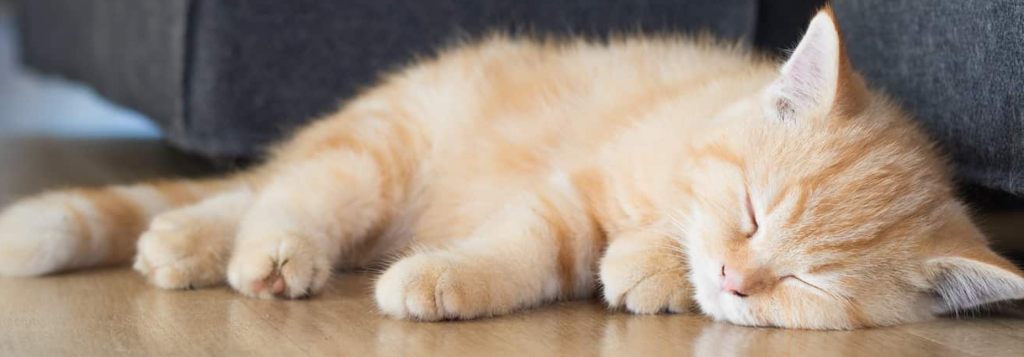
Given their need to eat every few hours, kittens are at risk when meals are missed. Kittens under 4 months old should never go more than 4 hours without access to food. Allowing a kitten to miss more than one or two meals in a row can quickly lead to health problems.
When kittens go too long without food, their blood sugar can drop dangerously low. This hypoglycemia causes the kitten to become weak, lethargic, and unable to control their body temperature. Very young kittens may even suffer seizures when their blood sugar crashes from lack of food. These symptoms require emergency veterinary care to get the kitten’s blood sugar stabilized.
Missing meals also disrupt the kitten’s metabolism. The body responds by slowing down calorie burning to conserve its limited energy stores. But this makes it harder for the kitten to digest food once they start eating normally again. An abrupt change from fasting back to regular feedings can overwhelm their digestive system.
Starvation also suppresses the immune system. Kittens who are deprived of food will be more vulnerable to viruses, bacteria, and parasites. Intestinal diseases and respiratory infections could take hold in the malnourished body. Recovery and growth can be stalled as the kitten directs energy toward fighting off illness.
The severe effects of starvation on kittens should never be risked. Kittens who go without food for too long are in danger of organ damage, permanent developmental issues, brain damage, and even death. Providing food at the proper intervals is essential no matter what.
How Long Kittens Can Safely Go Without Food
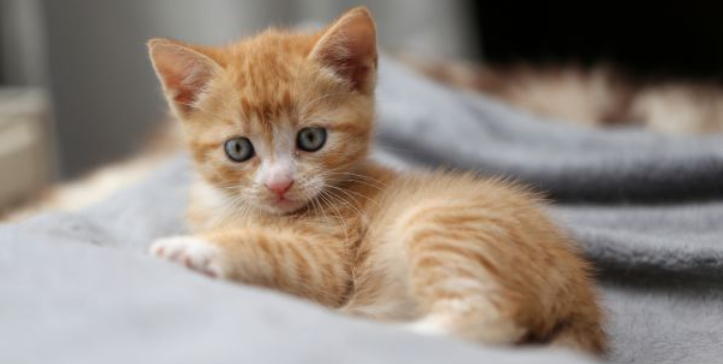
The exact number of hours a kitten can go without food depends largely on their age. The younger the kitten, the more frequently they need to eat.
Newborn Kittens:
Newborns rely completely on nursing from their mother every 2-3 hours. They cannot survive more than 12 hours without access to her milk. If orphaned at birth, newborn kittens need emergency bottle feeding by a caregiver every 2-4 hours to avoid hypoglycemia.
1-4 Week Kittens:
Kittens under 4 weeks old have very limited energy stores and absolutely must eat every 3-4 hours. They should never go more than 4 hours without nursing or bottle feeding. Allowing 12 hours to pass without food risks life-threatening hypoglycemia.
4-8 Week Kittens:
Around 4 weeks old, kittens can begin the weaning process as their mother gradually produces less milk. They still need to eat about every 4 hours but can start lapping kitten formula, gruel, or wet food from a dish. Missing more than one meal in a row jeopardizes their health.
2-4 Month Kittens:
As their digestive system matures, kittens at 2-4 months old can handle slightly longer periods between meals. They should continue eating small amounts every 4-6 hours. Allowing 8-12 hours to pass without food may cause low blood sugar.
Over 4 Months:
Kittens over 4 months old may be able to last up to 12 hours between meals, like an adult cat. But continuing the frequent feeding schedule supports optimal growth. The kitten’s age, health status, activity level, and metabolism determine their unique needs.
Any signs of hypoglycemia, digestive upset, or behavior changes indicate a need to resume more frequent feedings. Growing kittens should not be forced to wait long between meals. Free choice feeding or multi-meal schedules help ensure kittens always have access to the nutrition they require.
Factors That Shorten How Long Kittens Can Go Without Food
Several factors can decrease the number of hours a kitten can safely go without food:
- Age: The younger the kitten, the more often they need to eat. Newborns need to eat every 2-4 hours without exception.
- Small size: Kittens who are small for their age or undersized have fewer energy reserves. They may need meals spaced slightly closer together.
- High activity level: Rapidly growing, energetic kittens burn through calories faster. They need more frequent meals to fuel their adventures.
- Illness: Sick kittens have increased calorie needs but often smaller appetites. They are at high risk if meals are missed, so food should always be available.
- Parasites: Intestinal parasites divert nutrition away from the kitten’s body. This depletion requires more frequent feedings to obtain adequate nutrition.
- Poor nutrition: Kittens eating low-quality diets may fail to thrive and need more frequent energy replenishment. Their bodies are not deriving enough nutrients from each meal.
- Weaning transition: When first transitioning from nursing to solid foods around 4-6 weeks old, kittens may struggle withdigestion. More frequent small meals help keep their blood sugar stable.
- Colder temperatures: Kittens burn extra calories keeping warm. They may need their meal schedule adjusted to account for increased energy expenditure in cold weather.
These high-risk situations lower a kitten’s reserves making consistent feedings even more vital. Understanding the individual kitten’s unique needs guides appropriate meal frequency. When in doubt, it is always safer to feed on the more frequent side to avoid any nutritional deficits.
Signs a Kitten Needs to Eat
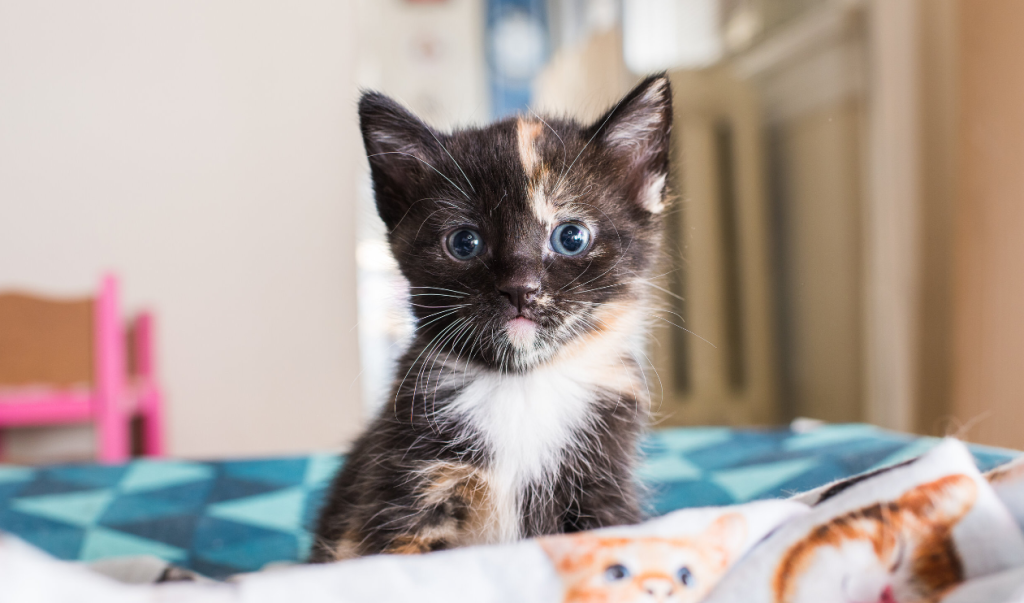
Kittens are generally very eager eaters. A decreased appetite or disinterest in food is an alarming sign a kitten is unwell or failing to thrive. But even a healthy kitten with a strong appetite can display symptoms indicating it is time for their next meal:
- Restlessness and crying: Kittens who seem restless or vocalize insistently are often asking to be fed. Their little bodies are signaling hunger.
- Difficulty sleeping: Just like people, kittens can have trouble settling down to sleep when hungry. An overly tired yet restless kitten likely needs a meal.
- Playing with or chewing on non-food items: Kittens explore objects in their environment when seeking food. Chewing and licking random items may indicate food-seeking behavior.
- Seeking out food dishes: A kitten who returns frequently to areas where their food is normally available is showing feeding cues.
- Lethargy: Once their limited energy reserves are depleted, kittens become sleepy and inactive. Do not mistake this exhaustion for normal napping – it is a serious sign of starvation.
- Weakness: Hunger causes muscle weakness and wobbliness in kittens. They may struggle to stand or have trouble walking steadily if too long without food.
- Hypothermia: Very young kittens rely partially on food metabolism to maintain body heat. Chilling and low body temperature from missed feedings requires emergency rewarming and refeeding.
While every kitten has a unique schedule best suited to their age and needs, monitoring these signals helps identify when it is time for the next meal. Responding promptly to a kitten’s feeding cues is crucial.
Ensuring Kittens Eat Enough
Kittens have very specific nutritional requirements. Simply making food available is not always enough – steps should be taken to entice kittens to eat adequately at each meal:
- Offer fresh food: Kittens are more likely to eat when their food smells tasty and appealing. Picking up uneaten wet food in 15-30 minutes avoids spoilage between meals.
- Try different textures: Blended, gruel-like wet foods are easier for young kittens to digest. Gradually transitioning to chunkier textures helps expand their preferences.
- Warm it up: Warming canned food to just a bit above body temperature enhances its aroma and palatability. Take care it is not too hot to avoid mouth burns.
- Mix in kitten milk replacer: Adding a splash of kitten formula to wet food adds extra hydration and improves the flavor. The milk also provides supplemental nutrition.
- Consider hand feeding: Some kittens are more willing to eat wet food when hand fed a dollop at a time. This helps them associate meal time with bonding.
- Offer multiple small meals: Free choice feeding or meals spread throughout the day encourages grazing behavior. More frequent smaller portions prevent overfilling.
- Keep distractions away: Loud noises, activity, and stress during meals may dissuade kittens from eating. Offer food in quiet, calm areas.
- Give praise and affection: Kittens are more motivated to eat when petted. Gently stroking and speaking softly while they eat calms and reassures them.
Monitoring wet food intake and weight gain against growth charts ensures kittens remain well-nourished. Working with a veterinarian helps design an optimal feeding regimen meeting the kitten’s needs.
What to Do if a Kitten Misses a Meal
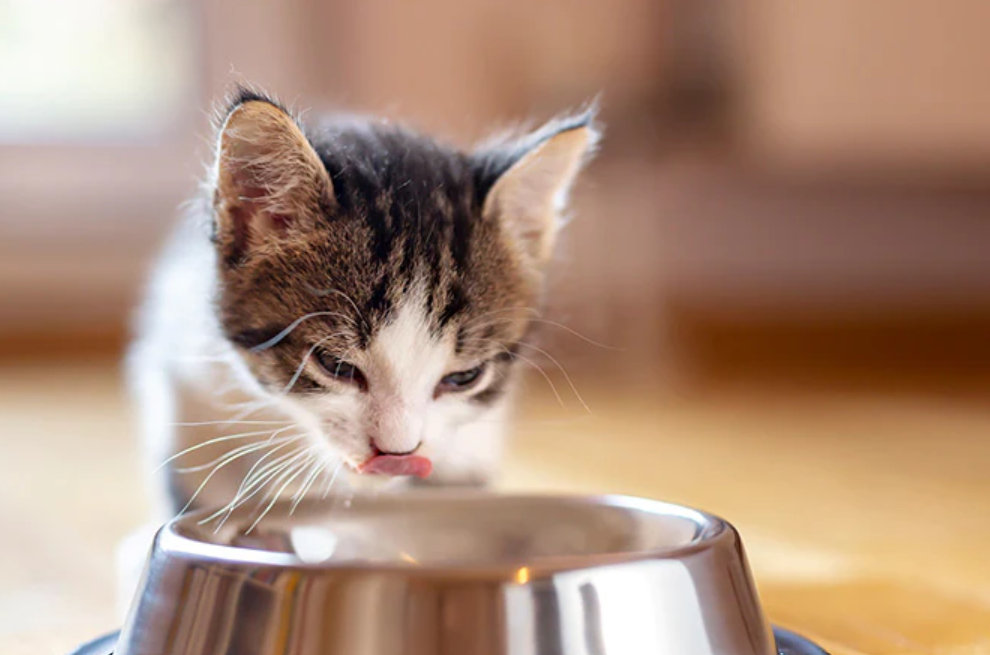
While kittens should never intentionally be deprived of food, unexpected circumstances can sometimes prevent them from eating on time. Young kittens who miss a single meal need close monitoring for any signs of hypoglycemia or distress. Missing two or more consecutive meals jeopardizes their health.
If an unavoidable situation has caused a kitten to miss one or more meals:
- Offer food as soon as possible. Do not wait until their normal next scheduled mealtime. The sooner nutrition can be restored, the better. For extremely young kittens, emergency formula through a bottle is ideal to quickly elevate blood sugar.
- Gradually reintroduce feeding. After a disruption in meals, give very small amounts of food at first. About 1-2 teaspoons every 1-2 hours helps stabilize the kitten without overwhelming their digestion. Slowly increase meal size and duration between meals back to normal.
- Monitor for symptoms. Watch closely for lethargy, unsteadiness, chilling, and other warning signs in the first 12-24 hours after refeeding begins. CALL A VET immediately if the kitten seems unstable or unable to keep food down after eating. A vet can administer supplemental glucose and fluids to recover from missed meals.
- Adjust the feeding schedule. The event may indicate a need to space meals slightly closer together for the kitten’s age and health status. Adjusting meal frequency helps prevent future issues.
With prompt action, most kittens bounce back after skipping a couple of meals. But veterinary care is essential if weakness, hypothermia, or other problems develop after refeeding. Prevention through proper meal frequency remains imperative.
When Kittens Should Have Food Removed
While kittens generally benefit from constant access to food, some exceptions exist:
- At night: To encourage sleeping through the night, remove wet food a couple of hours before bed so the kitten has time to digest and eliminate. Keep dry food available for nibbling if needed.
- Before surgeries: Vets recommend withholding food after midnight to prevent complications from anesthesia. Allow access to water until right before surgery to avoid dehydration.
- With suspected foreign bodies: If string, toys, or other objects are suspected to be lodged in the intestines, the vet may recommend withholding all food temporarily. This resting of the digestive tract helps localize an obstruction.
- Before testing: Certain diagnostics like glucose curves require fasting to get accurate results. Follow veterinary instructions for appropriate fasting duration based on the kitten’s age.
In these specific situations, the benefits of temporarily restricting food access may outweigh risks. Kittens require extra monitoring while food is removed to watch for any symptoms of starvation. Normal feeding should resume immediately following tests, surgeries, and overnight fasts.
When to Call the Vet About Hunger or Starvation
Starvation places kittens in a life-threatening medical crisis requiring professional treatment. Contact a vet promptly if any of the following occur:
- Failure to eat for more than 4-6 hours (depending on age)
- Signs of hypoglycemia after missed meals – weakness, lethargy, low body temperature, seizures
- No interest in food for more than 24 hours
- Excessive crying and searching behaviors indicating extreme hunger
- Continued weight loss or inability to gain weight appropriately
- Life-threatening foreign body obstruction requiring fasting
While missing the occasional meal may not cause lasting harm in otherwise healthy older kittens, severely depriving a kitten of food can have fatal consequences. Kittens experiencing starvation urgently require veterinary assessment and treatment. With aggressive intravenous fluid therapy, glucose supplementation, warming, and supportive care, many starved kittens will recover fully. But preventing starvation through proper nutrition is far safer than attempting to reverse it.
Keeping Kittens Well-Fed
The exceptional nutritional needs of rapidly growing kittens cannot be overstated. Kittens simply must eat adequate quantities of food far more often than adult cats. While the exact feeding schedule should be tailored to each kitten’s age, health status, and environment, most require meals at least every 8 hours and often more frequently than that.
Allowing kittens to experience painful hunger deprives them of nutrition essential for growth and risks life-threatening complications. Monitoring for signs of hunger and responding promptly with an appropriate meal gives kittens their best chance at growing into healthy, thriving cats. With a commitment to frequent feeding, attentive caregivers can ensure kittens receive the calories and nutrition their developing bodies require.

